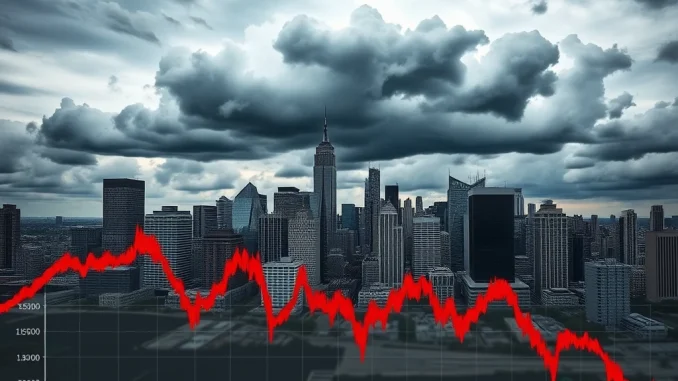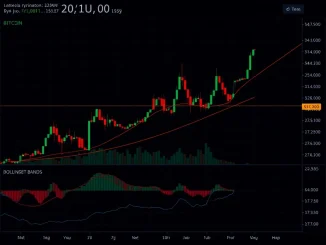
Buckle up, crypto investors! The CEO of BlackRock, the world’s largest asset manager, just dropped a bombshell. Larry Fink has declared that we are currently in a recession and warned that markets could potentially fall even further. For those invested in the volatile world of cryptocurrencies, this news isn’t just a headline; it’s a potential tremor that could shake your portfolio. Let’s dive deep into what this means for the crypto space and how you can navigate these turbulent times.
Is a Recession Really Here? BlackRock CEO Sounds the Alarm
Larry Fink’s statement isn’t just another economic forecast; it’s a significant signal coming from the helm of a company managing trillions of dollars. BlackRock’s insights are closely watched by investors globally, and Fink’s direct acknowledgment of a recession carries weight. Here’s a breakdown of why this is a big deal:
- Credibility: BlackRock manages more assets than any other company in the world. Their economic analysis is based on vast amounts of data and expert insights.
- Market Influence: Fink’s words can directly influence market sentiment. When the CEO of BlackRock speaks about a recession, investors listen and often react.
- Global Perspective: BlackRock’s reach is global, meaning their assessment isn’t limited to one region. A recession declared by them likely has widespread implications.
While economists have been debating the likelihood of a recession for months, Fink’s definitive statement adds a layer of urgency. It’s no longer a question of ‘if’ but more of ‘how deep and how long’ this recession might be.
Why Should Crypto Investors Care About a Market Downturn?
Cryptocurrencies, while often touted as being ‘uncorrelated’ to traditional markets, haven’t always behaved that way, especially during periods of economic stress. Here’s why a broader market downturn, as predicted by Fink, should be on every crypto investor’s radar:
- Risk-Off Sentiment: In times of economic uncertainty, investors tend to move towards safer assets. This ‘risk-off’ sentiment can lead to a sell-off in riskier assets like cryptocurrencies.
- Liquidity Crunch: Recessions can lead to tighter liquidity in the market. Investors may need to sell assets, including crypto, to raise cash.
- Correlation Concerns: While long-term correlation might be debated, in the short-term, crypto markets have often shown correlation with stock markets, particularly tech stocks. A stock market downturn could drag crypto down with it.
- Investor Psychology: Fear and uncertainty can drive market behavior. Recession fears can trigger panic selling across all asset classes, including crypto.
Think of it like this: when the economic tide goes out, all boats, even the crypto yachts, can get pulled down. Understanding this interconnectedness is crucial for navigating the potential market downturn.
Decoding Larry Fink’s Investment Outlook: What’s Next?
Fink’s warning isn’t just about stating the obvious; it’s about signaling a potential shift in investment outlook. What can we infer from his statements and how should crypto investors adjust their strategies?
Key Takeaways from Fink’s Perspective:
- Prepare for Volatility: Fink’s prediction suggests increased market volatility. Crypto markets are already known for their wild swings, and a recessionary environment could amplify this. Expect more price fluctuations.
- Focus on Quality: In a downturn, the quality of your investments matters more than ever. For crypto, this could mean focusing on established cryptocurrencies with strong fundamentals rather than speculative altcoins.
- Long-Term Vision: Recessions are cyclical. While short-term pain is possible, a long-term investment outlook can help you ride out the storm. Consider this a time to potentially accumulate quality crypto assets at lower prices if you have a long-term belief in the space.
- Diversification is Key: Don’t put all your eggs in one basket, especially in a recession. Diversify your portfolio across different asset classes, including and beyond crypto, to mitigate risk.
Actionable Insights for Crypto Investors:
| Action | Why it Matters |
|---|---|
| Review your portfolio risk | Ensure your crypto allocation aligns with your risk tolerance, especially in a recessionary environment. |
| Stay informed | Keep up-to-date with economic news and market analysis, not just crypto-specific news. |
| Consider dollar-cost averaging (DCA) | If you believe in the long-term potential of crypto, DCA can be a less risky way to invest during volatile times. |
| Don’t panic sell | Emotional decisions can be costly. Stick to your investment strategy and avoid impulsive selling during market dips. |
The Fink Factor: Why Larry Fink’s Words Move Markets
Larry Fink isn’t just another CEO; he’s become a towering figure in the financial world. His opinions and insights carry significant weight, and here’s why:
- Decades of Experience: Fink has been in the investment industry for decades, weathering numerous economic cycles. His experience informs his perspective.
- BlackRock’s Scale: As CEO of BlackRock, he oversees trillions of dollars in assets. This gives him unparalleled visibility into global markets and economic trends.
- Thought Leadership: Fink is often seen as a thought leader, shaping the conversation around investing and the economy. His pronouncements are widely reported and analyzed.
- Investor Confidence: Many investors, both institutional and retail, look to figures like Larry Fink for guidance. His views can influence investor confidence and market direction.
When Larry Fink speaks, the market tends to listen, and often reacts. His recession warning is a signal that shouldn’t be ignored, especially by those navigating the complex and often unpredictable world of cryptocurrency investments.
Navigating the Recession: Is Crypto a Safe Haven or Stormy Seas?
The question on every crypto investor’s mind is: in a recession, is crypto a safe haven or will it be tossed around in stormy seas? The answer, like most things in crypto, is nuanced.
Arguments for Crypto as a Safe Haven (in a Recession):
- Decentralization: Crypto’s decentralized nature can be seen as a hedge against traditional financial system risks.
- Inflation Hedge (in theory): Some argue Bitcoin, in particular, is a hedge against inflation due to its limited supply. However, this hasn’t always played out in practice in recent inflationary periods.
- Innovation and Long-Term Growth: Regardless of short-term economic cycles, the underlying technology and innovation in the crypto space continue to advance.
Arguments Against Crypto as a Safe Haven (in a Recession):
- Volatility: Crypto’s high volatility can be amplified in a recession, making it a risky ‘safe haven’.
- Correlation (Short-Term): As mentioned earlier, short-term correlation with traditional markets can lead to crypto downturns during economic stress.
- Regulatory Uncertainty: Economic downturns can sometimes lead to increased regulatory scrutiny, adding another layer of uncertainty to the crypto market.
The Verdict? Crypto is likely not a traditional ‘safe haven’ in the way gold or government bonds are. It’s more of a high-growth, high-risk asset that can be significantly impacted by broader economic conditions, including a recession. However, for long-term believers, a recession could present opportunities to accumulate assets at lower prices.
Conclusion: Heed the Warning and Prepare Your Crypto Portfolio
Larry Fink’s recession warning is a stark reminder that even in the innovative and rapidly evolving world of cryptocurrency, we are not immune to broader economic realities. A potential market downturn driven by a recession could bring further volatility and challenges to the crypto space. However, by staying informed, understanding the risks, and maintaining a long-term perspective, crypto investors can navigate these uncertain times and potentially emerge stronger on the other side. Don’t panic, but do prepare. The urgent message from BlackRock’s CEO is clear: caution is the watchword in today’s economic climate.



